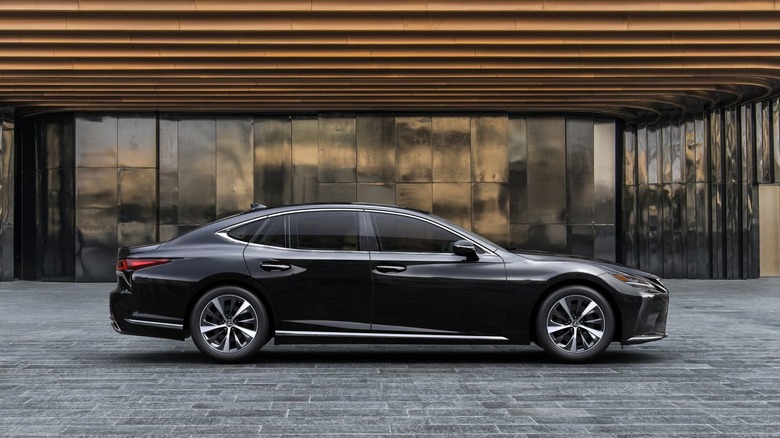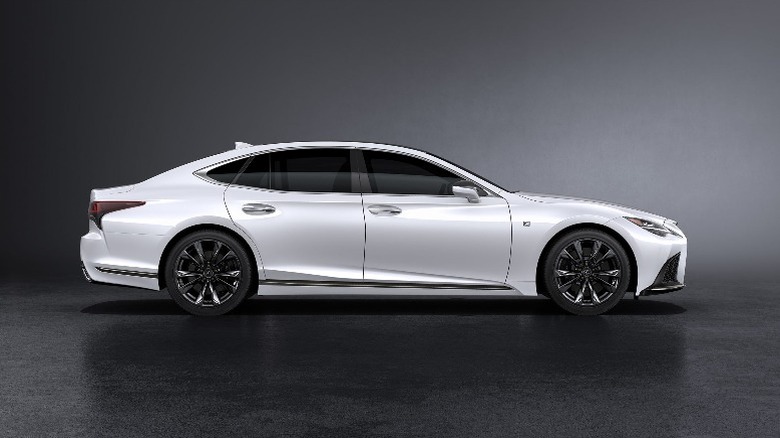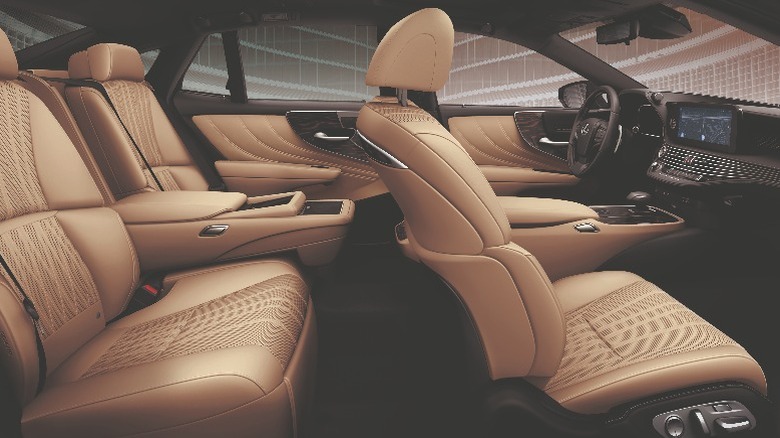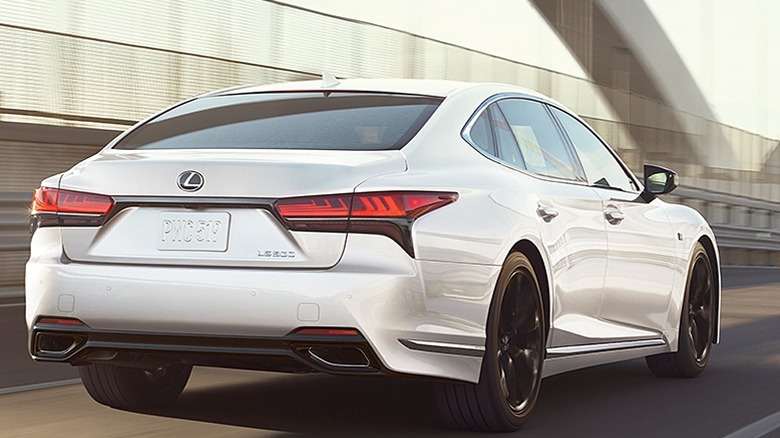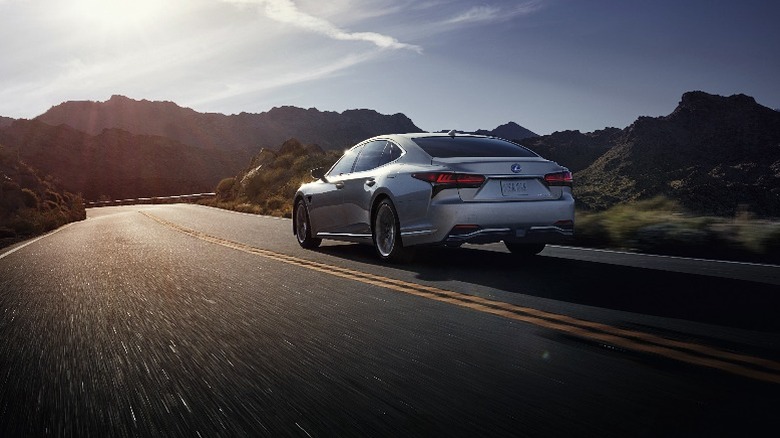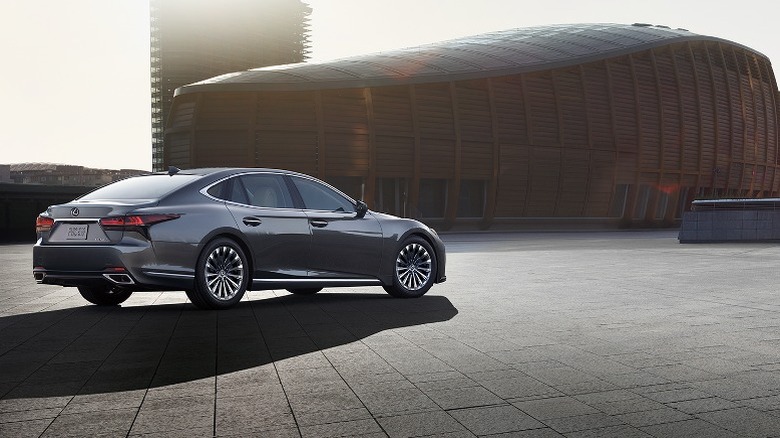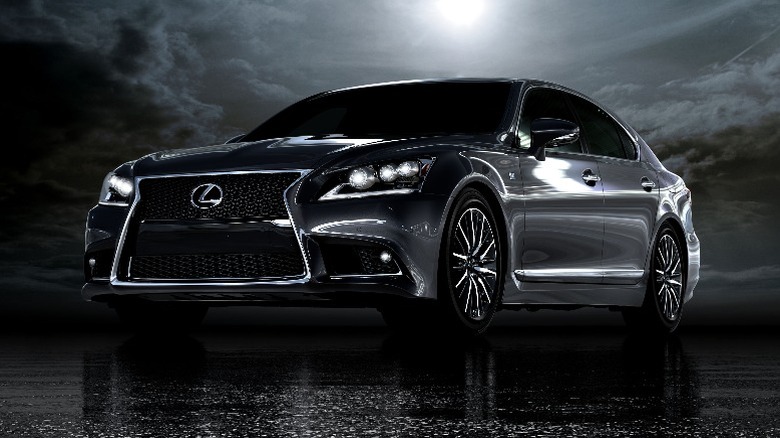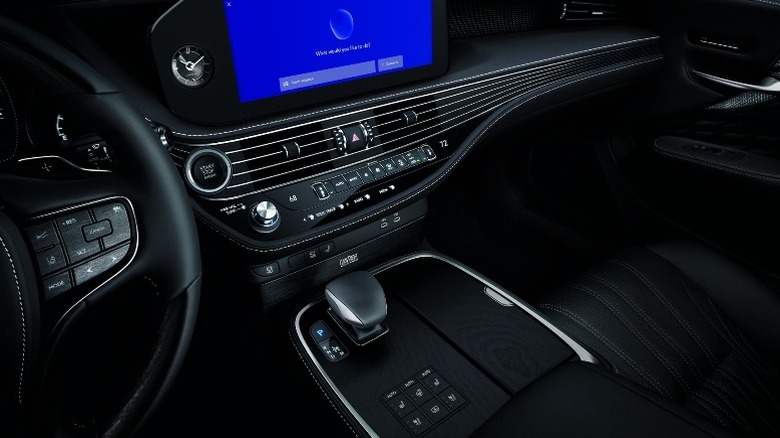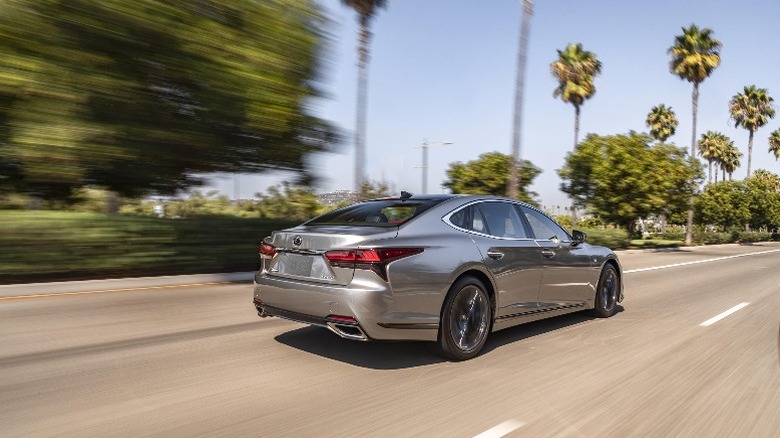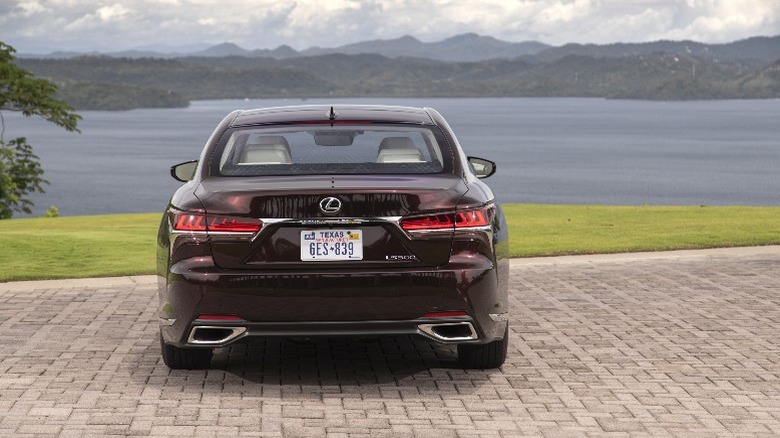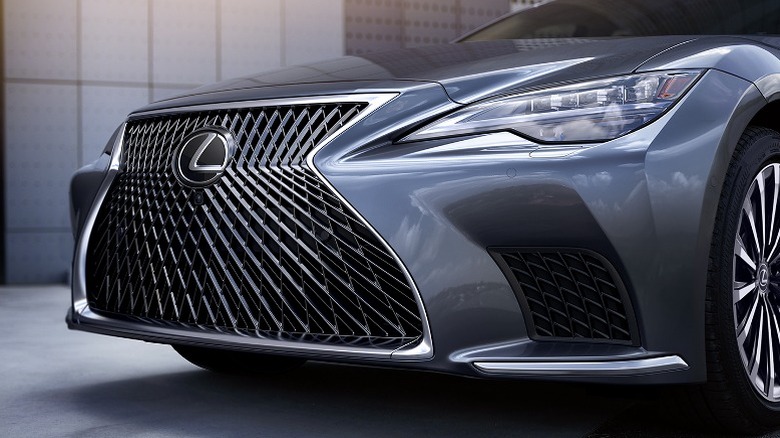10 Things You Should Know Before Buying A Lexus LS (New Or Used)
Although Lexus is a division of Toyota, it's done a hell of a job creating a distinct identity for itself as a leader in the luxury automobile market. It shares Toyota's reputation for reliability and build quality, and has developed a unique focus on craftsmanship, comfort, and advanced technology.
Of all the cars that have rolled off Lexus' assembly line, arguably the most iconic is the LS series, its flagship line of full-size sedans. For a long time, the LS has been synonymous with high-end luxury which has made it a hot commodity on both new and used markets. If you're here, you're probably eyeing one too. But before you take the plunge, you should know exactly why it's so desirable, as well as any potential drawbacks that might make you think twice about getting one.
Whether you're looking to buy one fresh off the lot or shopping at the used market, let's go over 10 things you should know before you decide to put one in your garage.
Luxury craftsmanship at its finest
When you buy Lexus, you're buying luxury. Quality leather upholstery, real wood accents, hand-pleated door trims, intricate Kiriko glass accents — with all of this combined, the LS screams top-tier quality.
Lexus boasts that it goes the extra mile in pursuit of perfection, whether that is inventing specialized machinery for the production process or thoroughly and meticulously inspecting each vehicle that leaves its manufacturing plants. And you can expect this in any model you purchase, whether you're buying new or used.
In addition to aesthetics, the LS is known for durability, alongside every other Lexus model. The body structure is designed to keep passengers safe over years of driving. It does so by utilizing high-strength steel and advanced manufacturing techniques.
The materials used in the LS mostly hold up well over time, so you can rest assured that you'll enjoy a premium experience even in older models. However, there's one thing you should keep an eye out for when buying used models. A lot of older Lexus models have complaints of cracked/melted dashboards or interior panels, which we'll go into later on.
A quiet and comfortable cabin
One of the standout features of the LS is its almost silent interior, one of the defining features of any Lexus vehicle. Using a combination of acoustic glass, active noise cancellation, and active sound control technology, you can not only minimize disturbance from outside the car, but control the ambience of the cabin.
In fact, Lexus claims that the seat cushions of the 2024 LS500 are even designed to reduce vibrations so you can enjoy music and conversation without unwanted disruption.
The cabin of the LS is not only quiet, it's also pretty comfortable. With generous legroom and headroom, passengers in the front and back seats can stretch out comfortably, especially in long wheelbase versions of the LS. The roomy cabin is complemented by high-quality materials like leather and alcantara, as well as adjustable seats with options for heating, cooling and a massage function.
Performance varies by model year
One major qualm a lot of people seem to have with the LS is the fact that compared to a lot of its rivals on the market, and given its premium price tag, the LS leaves a little to be desired when it comes to speed and performance. In fact, in our recent review of the 2024 LS, its underwhelming driving experience was a major downside.
Over the years, Lexus has transitioned the LS powertrain options from naturally aspirated V8 engines to turbocharged V6 engines. Even with fewer cylinders, the newer engines still offer better performance, thanks to the introduction of twin turbochargers. On the 2024 LS, for example, there's a 3.4-liter twin-turbocharged V6 engine under the hood that outputs 416 hp while the older 2013 LS460 with the larger 4.6-liter V8 engine only delivers 386 hp.
Opting for a hybrid version of the LS500 actually gives you significantly lower performance than a fully gas-powered LS. Though of course, it's worth considering because of better fuel economy and the positive impact on the environment.
You have a number of brand-new options available
Outside of the base model, there are other versions of the 2024 LS500 available to you if you're buying new. The current LS500 lineup consists also includes the LS500 F Sport and the LS500h AWD.
The F Sport, contrary to what its name implies, isn't in any way a performance-oriented model. It's merely a superficial variation that caters to buyers who want a sportier experience, with enhancements like performance-tuned suspension, bolstered sports seats, and aggressive exterior styling. It still comes with the same 3.4-liter V6 engine as the base model and performs basically the exact same way.
The LS 500h AWD is the hybrid version and modifies the powertrain on the base model, combining a V6 engine with electric motors to offer improved fuel efficiency. And although you might be a fan of that, your wallet probably won't be, as you're looking at a price jump of about $35,000 from the base model, which is a very pretty penny.
On top of the different versions, each of these models can be enhanced with multiple packages which include selling points like front and rear acoustic glass, adaptive variable air suspension, and a panoramic view monitor, among other bells and whistles.
Fuel economy could be better
While the Lexus LS500 delivers impressive power, fuel economy isn't its strong suit. It's not terrible, but there's nothing particularly great about it either. The standard LS500 with rear-wheel drive offers an EPA-estimated 18 mpg in the city and 29 mpg on the highway. These figures lag behind some competitors, especially in a market where efficiency is becoming more important. Take the 2024 Mercedes-Benz S500 for example. When equipped with the 3.0-liter inline-six engine, it has a slightly better EPA rating of 21 mpg in the city and 30 mpg on the highway.
Even the hybrid model of the LS500 barely improves fuel economy, with EPA ratings of 22 mpg in the city and 29 mpg on the highway. This hardly meets the expectations for a hybrid model — the hybrid version of the 2025 ES300, another Lexus sedan, has a rating of 43/44 mpg. This less-than-ideal fuel efficiency is even worse in older V8 models. For example, the 2004 Lexus LS430 has an EPA rating of 16 mpg in the city and 23 mpg on a highway.
Not every model is a hit
Lexus hasn't made many misses, which contributes to its reputation for reliability, but not every car from the luxury manufacturer has been a complete hit. When shopping for an LS, especially a used one, there are some models you should steer clear from, either due to recalls or multiple complaints from previous owners.
We recently covered some Lexus models that buyers browsing the used market should avoid, and the LS460 found itself on that list. One of the biggest problems that LS owners seem to encounter is the dashboard and interior door panels starting to get sticky and then eventually melting and cracking. Lexus addressed this problem by offering free replacements under a limited warranty program, but chances are that if you buy a used LS460 with this issue it'll be far too late to be covered.
The LS460 has also been recalled on multiple occasions due to some serious safety hazards, like potential sudden engine failures and engine fires. These issues shouldn't worry you much if you're buying a brand-new model from recent years. But if you're shopping on the used market, especially if you're looking at older models, you should definitely conduct a thorough inspection of any car before driving it off the lot.
Luxury depreciation is real
You read that right. At this point, we've established that Lexus is known for its reliability and long-term value, but the truth is that luxury sedans tend to depreciate more rapidly than their non-luxury counterparts — and this is true for most of the major luxury car brands. In fact, it's not uncommon for high-end car models like the LS to lose around 60% of their value within the first three years of ownership. According to Kelley Blue Book, the 2022 Lexus LS has depreciated by almost $26,000 in the two years since its release.
It's not all bad though. This depreciation can work in your favor if you're thinking of buying used rather than brand new. After a few years, the worst of the depreciation has already occurred, meaning you can find a modern luxury sedan in great condition at a reasonable price point. But still, it's important to weigh the trade-off you're making in the event you end up wanting to sell down the line. For some, the strong reliability and lower-than-average maintenance costs associated with the Lexus brand will make it all worth it.
Advanced technology
As a luxury competitor in the full-size sedan market, you can expect the LS to come packed with features that not only make your driving experience more comfortable and convenient but also ensure that you're as safe as possible during every ride.
Alongside standard creature comforts like Apple CarPlay, Android Auto, and wireless charging, you can expect plenty of functionality in a brand-new 2024 LS. One standout feature is the ability to use voice commands to control almost every key function, including cabin temperature, navigation routes, and audio volume. And because its interface is equipped with artificial intelligence, it has the ability to become smarter over time and with regular software updates.
When it comes to safety, the LS doesn't skimp either. Features like adaptive cruise control, lane-keeping assist, and automatic emergency braking help make daily driving less stressful, giving you an added feeling of safety, whether you're behind the wheel or in the passenger seat. While these tech features have become the standard in this class of vehicles, they do a solid job of enhancing the overall driving experience.
If you're shopping on the used market, older models still have a handful of tech offerings, but the user interface can feel dated, especially in models that use a trackpad for controls.
Relatively reasonable true cost of ownership
Lexus has earned a solid reputation as a reliable player in the luxury car market, and the accolades back it up. It were named Most Dependable Brand by J.D. Power in both 2024 and 2023, and has repeatedly won Kelley Blue Book's Best Luxury Brand title in its 5-Year Cost to Own Awards.
Also, according to RepairPal, the average maintenance cost for a Lexus is around $551 per year, significantly lower than the industry average of $652. So this means you don't have much to worry about when it comes to maintenance and long-term ownership costs. But nothing is ever completely perfect, and although you're unlikely to have recurring maintenance issues, you can't completely rule out that possibility.
Also, outside of regular maintenance and minor issues that could pop up here and there, there's always the risk that you have a serious repair issue to deal with, especially when buying used. And since luxury cars are notoriously more expensive to repair, you could find yourself in a pretty sticky situation.
One thing you could do to mitigate this risk is to opt for a Certified Pre-Owned vehicle. These are vehicles that have been thoroughly inspected and tested to make sure they function almost as well as something brand new. You should also make sure you inspect the maintenance records of whatever used car you're getting, even if you're purchasing from a person and not a dealership. This shows whatever previous faults the car might have had so you know what you're getting yourself into.
A Lexus isn't your only option
When shopping for a car, especially one as pricey as a Lexus, it's important to make sure that you're getting the best bang for your buck, and that involves taking a step back to explore similar products. You don't want to have that facepalm moment down the line when you realize that you could've gotten a car that's better suited to your needs for a similar or even lower price. Taking the time to compare other luxury sedans can help you avoid that, and ensure your happiness in the long run.
It's not news that the LS is one of the leaders of the luxury flagship sedan market, but the Mercedes-Benz S-Class has long been the standard when it comes to luxury sedans, and for good reason. It has a much more premium look and feel than the LS, and offers even more prestige and cutting-edge features.
Another often-overlooked contender that's worth considering is the Genesis G90. In our review of the 2024 model, we found it delivered a great balance of functionality, performance, and luxury. Of course, then there's also the BMW 7 Series, a major player in the luxury market, and a worthwhile option in case you want a sportier, more dynamic drive.
